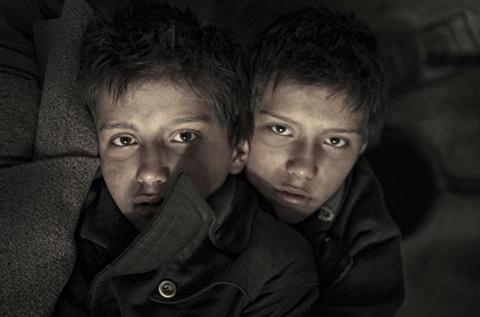Dir: Janos Szasz. Hungary-Germany-Austria-France. 2013. 100mins

One could easily dismiss Janos Szasz’ latest film as yet another piece of WWII horror memorabilia. But in all fairness, it would be a grievous mistake to do so - behind the familiar story of twin brothers being entrusted by their parents to their grandmother in the countryside, to keep them away from the dangers they would run in the city, lies one of the more ferocious and angry indictments of man’s inhumanity to man, told in as cold and objective a manner as a camera’s point of view is capable of.
The film’s ample use of her text in the voiceover readings, serves in this case not only to emphasise certain points but also to leave some of the more graphic horrors outside the frame.
A tough sale, given its reticence to raise any kind of empathy in its audience, The Notebook (Le Grand Cahier) is, however, the kind of film that no festival should miss and art houses will be delighted to show. The film premiered at the Karlovy Vary Film Festival.
Entirely told from the point of view of the twins, who speak with one voice, no character or place is identified by name. Entries from their diary accompany the film all through, and since they have been told as children that everything in it has to be precise, objective and devoid of any feelings whatsoever - for feelings are subjective and therefore misleading - that’s the way they write.
Intended as a universal piece of work, the film’s action does take place during WWII, but with slight amendments it could be easily moved to different places and periods in time. The grandmother the twins are sent to, a human gargoyle straight out of the Grimm Brothers tales, had most probably poisoned her husband and has been ignored by her daughter for over 20 years.
She stays in a remote farm all by herself, bitter, hateful, mean, a miser who fondly caresses her hidden jewelry every evening and takes out her spite on her uncalled guests. But instead of crying or whining, the twins decide the best defense they can put up is to teach each other how to resist every kind of punishment that could be inflicted on them, be it hunger, beatings, insults, cold, or any other misery.
They thrash each other cruelly to train withstanding pain; they fast for days in a row in case they will be given no food to eat, but they go on studying, as they have been bidden to do, with the help of a dictionary and a Bible, the only books they possess. At the same time, in a device reminiscent of Orwell’s 1984, they also eliminate from their own vocabulary not only the words which are insufficiently precise (like love), but also those whose memory might hurt them later.
Doing so, they may become better fit for the rules of survival the world has come to accept, but also turned into numb, toughened creatures, capable of perpetrating the most terrible deeds without batting an eye. Since nothing more can scare them, there is nothing they shrink from, whether it is intimidation, blackmail or murder, if the reasons are objectively justified.
By the end of the film, the only people not completely black are the oafish, harelip daughter (Orsolya Toth) of a deaf and blind neighbour; a Nazi officer (Ulrich Thomsen); a Jewish cobbler (Janos Derzsi) and finally the grandmother herself (Piroska Molnar), once she has been defeated by the twins’ resistance. Of all these characters, only the officer leaves the screen still alive, all the others are dead before the end.
Agota Kristof, on whose novel the script is based, has not only the distinction of having her book translated in some 30 languages but also of generating a literary scandal in France, where parents lodged a complaint against a high school teacher in 2000 for recommending such insensitive, “pornographic” literature to his students.
The film’s ample use of her text in the voiceover readings, serves in this case not only to emphasise certain points but also to leave some of the more graphic horrors outside the frame, replaced by pages out of the diary, sometimes animated, thus avoiding the emotional infatuation such scenes would evoke in the viewer and creating a distance between him and the events.
Janos Szasz directs it all with grim precision, as a slightly remote analytical essay on human behavior, which he has never particularly admired in his previous films as well. There is a stunning degree of stoic defiance in the performance of Laszlo and Andras Gyemant who are on screen in every single frame of the film; Ulrich Thomsen cleverly sneaks into the conduct of the Nazi officer a homosexual innuendo; Orsolya Toth is as rebellious and unruly as she has proven to be in the films of another Hungarian director, Kornel Mundruczo, and Molnar is as unbending and fierce as her film nickname (“witch”) is supposed to suggest.
Superb photography by Christian Berger (Haneke’s cameraman on The White Ribbon and Hidden) contrasts between the splendour of nature and the humans in it. True enough, no one will come out smiling out of this film, but then, that was probably never Janos Szasz’s intention to begin with.
Production companies: Hunnia Film, Intuit Pictures
International sales: Beta Films, www.betacinema.com
Producers: Sandor Soth, Pal Sandor
Screenplay: Andras Szeker, Janos Szasz, based on Agata Kristof’s novel Le Grand Cahier
Cinematography: Christian Berger
Editor: Szilvia Ruszev
Music: Johan Johanson
Masin cast: Laszlo Gyemant, Andras Gyemant, Piroska Molnar, Ulrich Thomsen, Ulrich Matthes, Gyongyver Bognar, Orsolya Toth, Janos Drzsi, Peter Andorai, Lajos Kovacs






















